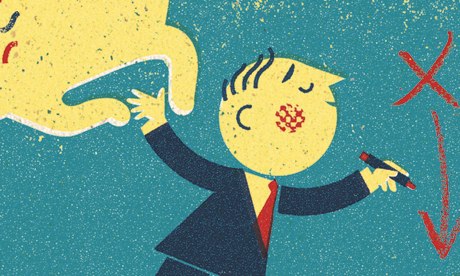
The tactic goes by many names, but my favourite is the Theory Of The Hairy Arm. An American business consultant, Lawrence San, tells the following story about a colleague he calls Joe, who worked as a graphic designer in the days before computers. One of Joe's clients was forever ruining projects by insisting on stupid changes. Then something odd started happening: each time the client was presented with a newly photographed layout, he'd encounter the image of Joe's own arm at one edge of the frame, partly obscuring the ad. "The guy would look at it," Joe recalled, "and he'd say, 'What the hell is that hairy arm doing in there?'" Joe would apologise for the slip-up. And then, "as he was stalking self-righteously away", Joe said, "I'd call after him: 'When I remove the arm, can we go into production?' And he'd call over his shoulder, 'Yes, but get that arm out of there first!' Then I'd hear him muttering, 'These people! You've got to watch them like a hawk.'"
That arm, of course, was no error: it was introduced so the client could object, and feel he was making his mark – and justifying his salary – while leaving the ad untouched. (I found the story via metafilter.com.) Other industries have equivalents. Among software developers, it's a duck, apparently thanks to the duck given as a pet to a character in the game Battle Chess: "That looks great," the producer reportedly told the artist. "Just one thing – get rid of the duck." The original version of Team America: World Police contained a four-minute sex scene (marionette sex, too!), so the ratings board could demand its removal. The hairy-arm tactic, then, is one more way to "manage your boss". But while the usual advice is to engage in weapons-grade flattery, or make yourself useful, it reminds us of a flipside often overlooked: those in authority desperately want to be made to feel useful themselves, too.
It's no surprise that this neediness should be felt most acutely among managers whose roles are to coordinate the work of others. Such jobs may be necessary, but it's notoriously hard to specify what they involve, or to measure success. In her book The End Of Leadership, the academic Barbara Kellerman argues that decades of "leadership studies" have made little progress in clarifying what leadership is, or how to teach it. You could see the whole history of economic activity as a progression from the satisfyingly concrete ("Today I harvested some wheat!") to the dizzyingly abstract ("I'm the client-side project manager for a team of web developers!"). No wonder modern executives will seize any chance they can to feel as if their day really mattered.
That doesn't mean the "need to feel needed" isn't felt more widely. It's surely universal: evidence from the long-running Harvard Study of Adult Development suggests that doing chores as a child – being useful, and knowing it – is one of the strongest predictors of adult mental health. But it's worth paying special attention to its workplace manifestations. When someone higher up the hierarchy needs to feel useful, it's an opportunity – to help them achieve that in ways that help, rather than hinder, your own work. And now that the Weekend editors have corrected the typos I littered through this column, I trust they'll leave the rest of it alone.
oliver.burkeman@theguardian.com
Follow Oliver on Twitter

